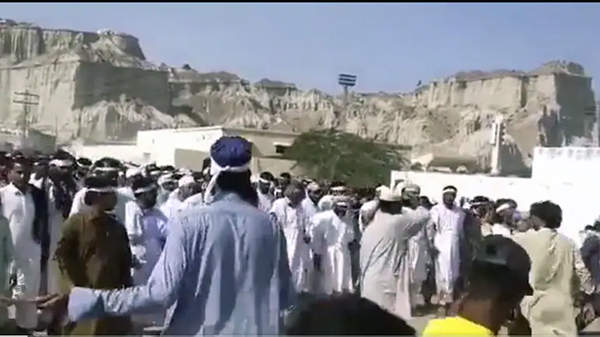
Resentment Against Chinese Exploitation
Massive protests erupted in Pakistan’s port city of Gwadar against unnecessary checkpoints, a severe shortage of water and electricity and threats to livelihoods from illegal fishing, part of a growing backlash in the country against China’s multibillion-dollar belt and road projects.
The protests organised by workers of some political parties, civil rights activists, fishermen and concerned citizens went on for a week at Y Chowk on Port Road in Gwadar, a coastal town in the restive Southwest Balochistan province of Pakistan.
The protesters demand the removal of unnecessary security check posts, availability of drinking water and electricity, eviction of big fishing trawlers from the Makran coast and opening of the border with Iran from Panjgur to Gwadar.
Head of the ‘Give rights to Gwadar’ rally Maulana Hidayat ur Rehman said the protests would continue until their demands were met, asserting that the government had not been sincere in resolving the problems of the local people living in the region.
Rehman strongly criticised the government in the past for failing to resolve the basic problems of the people of Gwadar.
“We are demanding the rights of Gwadar, which were usurped by the rulers and the people were even deprived of basic needs. The fishermen were not able to earn their livelihood as big trawlers were allowed for fishing at Makran Coast,” he said at a public meeting in October.
Rehman said despite building the Gwadar Deep Sea Port, the people of the city were still jobless and the government had done nothing about it.
“It is an insult for the sons of soil when they are stopped at checkpoints and inquired about their whereabouts,” he was quoted as saying.
The protests were part of growing discontent with China’s presence in Gwadar, whose port is an integral part of the $60 billion China-Pakistan Economic Corridor project (CPEC), the flagship project of China’s multi-billion-dollar Belt and Road Initiative (BRI).
India has protested to China over the CPEC as it traverses through Pakistan-occupied Kashmir (PoK). The massive infrastructure project connects China’s Xinjiang province with Gwadar port in Pakistan’s Balochistan province.
Gwadar port has long been portrayed as the jewel in the CPEC crown, but in the process, the city has become the very embodiment of a security state.
The authorities’ priorities are geared towards securing the port and its ancillary interests; the welfare of those for whom the area is home counts for little. Far from the port being a harbinger of an economic boom, the opposite has happened, The Dawn newspaper reported. Existing privations have deepened; people’s mobility is restricted by security forces and there is unwarranted questioning of their activities. Many say they are made to feel like strangers in their own land, it said.
Adding to the miseries of a large number of fishermen among the populace, the government, they complain, had issued licences to Chinese trawlers to fish in the waters off the coast. Their small boats cannot possibly compete, as a result of which their livelihoods were being squeezed. This was the petri dish of discontent from which the recent protests had sprung, it added.
Attacks Against Chinese
Balochistan is home to a long-running violent insurgency, and China’s presence in Gwadar has been the cause of much social unrest and led to anti-Chinese sentiment.
It has also given a fillip to Baloch militant insurgent groups, who have carried out terrorist attacks in protest at CPEC projects.
Baloch separatists, both militant and political groups, oppose China’s increasing involvement in the province. In November 2018, Baloch separatists attacked the Chinese consulate in Pakistan’s southern Karachi city.
On 21 August 2021, a convoy carrying Chinese personnel working on the East-Bay Expressway project was attacked by a suicide bomber in Gwadar. Two children were killed and three including one Chinese national was wounded in the attack.
On 14 July, 13 people, including nine Chinese engineers, died when a bus carrying the team working on the Dasu Hydropower Project was attacked by militants in Khyber Pakhtunkhwa province.
In October last year, gunmen killed at least 14 people near Ormara on the coastal highway after ambushing a convoy of vehicles travelling from Gwadar to Karachi, and in 2019, five people, including a Pakistani Navy soldier, were killed in an attack on the luxury Pearl Continental hotel in Gwadar.
While the threat from religiously motivated militants having sanctuaries in Afghanistan is very real, Baloch separatists also operate out of Pakistan’s western neighbour. The banned Baloch Liberation Army claimed it had carried out the Gwadar attack.
Anti-Chinese Resentment
Balochistan remains Pakistan’s poorest and least populous province despite a number of development projects Islamabad initiated there in the past. Rebel groups have waged a separatist insurgency in the province for decades, complaining that the central government in Islamabad and the richer Punjab province unfairly exploit their resources. Islamabad reacted to the insurgency by launching a military operation in the province in 2005.
With the China-Pakistan Economic Corridor (CPEC), Beijing aims to expand its influence in Pakistan and across Central and South Asia in order to counter US and Indian influence. The CPEC would link Pakistan’s southern Gwadar port in Balochistan on the Arabian Sea to China’s western Xinjiang region. It also includes plans to create road, rail and oil pipeline links to improve connectivity between China and the Middle East.
Brahamdagh Bugti, leader of the Baloch Republican Party living in exile in Switzerland, and grandson of slain nationalist leader Nawab Akbar Bugti, says that Chinese economic projects in Balochistan were aimed at “colonizing” the province, and must be resisted. “None of the previous development projects in Balochistan have ever been beneficial to the province or its people,” Bugti says.
Pakistani Opposition senators say that the Pakistan government was appeasing China and giving contracts to Beijing without taking the Baloch people into confidence. Despite Chinese investments, Balochistan remains extremely poor with no proper health facilities, education and housing or even clean drinking water.
Balochistan province was not getting its due share of royalties from the Chinese projects. The contractual process and terms with the Chinese companies were not transparent.

















